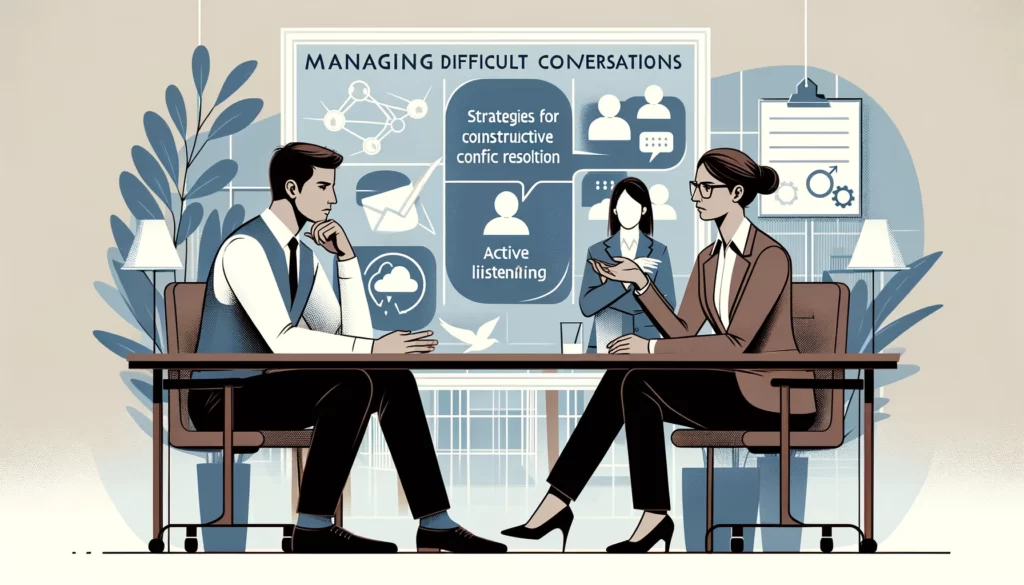Difficult conversations are inevitable in both personal and professional settings. Whether it’s addressing performance issues with a colleague or resolving conflicts with a business partner, the ability to manage these conversations effectively is crucial for maintaining healthy relationships and achieving positive outcomes. Here are some strategies for constructive conflict resolution: Prepare Mentally: Before entering […]

Difficult conversations are inevitable in both personal and professional settings. Whether it’s addressing performance issues with a colleague or resolving conflicts with a business partner, the ability to manage these conversations effectively is crucial for maintaining healthy relationships and achieving positive outcomes.
Here are some strategies for constructive conflict resolution:
- Prepare Mentally: Before entering into a difficult conversation, take some time to prepare yourself mentally. Clarify your goals for the conversation and anticipate potential challenges or objections. Remind yourself of the importance of addressing the issue constructively and maintaining a positive outcome.
- Choose the Right Time and Place: Timing and location can significantly impact the success of a difficult conversation. Choose a time and place where both parties can speak openly and without distractions. Avoid discussing sensitive topics in public or during times of heightened stress.
- Establish Common Ground: Begin the conversation by establishing common ground and acknowledging the importance of maintaining a positive relationship. Emphasize your shared goals and interests, and express your commitment to finding a mutually acceptable solution.
- Practice Active Listening: Actively listen to the other party’s perspective without interrupting or passing judgment. Pay attention to both verbal and nonverbal cues, and demonstrate empathy and understanding for their feelings and concerns. Reflect back what you hear to ensure clarity and validation.
- Communicate Effectively: Clearly articulate your own thoughts, feelings, and concerns in a respectful and non-confrontational manner. Use “I” statements to express your perspective without blaming or accusing the other party. Focus on the specific behaviors or actions that are causing the issue, rather than making generalizations or assumptions.
- Seek Collaborative Solutions: Instead of approaching the conversation as a win-lose scenario, strive to find collaborative solutions that address the needs and interests of both parties. Brainstorm potential solutions together and be open to compromise and flexibility. Look for creative alternatives that satisfy both parties’ objectives.
- Manage Emotions: Difficult conversations can evoke strong emotions, but it’s essential to remain calm and composed throughout the discussion. Take breaks if necessary to cool off and regain your composure. Remember that emotions are natural, but they should not dictate the tone or direction of the conversation.
- Follow Up: After the conversation, follow up with the other party to ensure that any agreements or action plans are implemented effectively. Continue to communicate openly and transparently to address any lingering concerns or issues that may arise.
In conclusion, managing difficult conversations requires patience, empathy, and effective communication skills. By preparing mentally, choosing the right time and place, establishing common ground, practicing active listening, communicating effectively, seeking collaborative solutions, managing emotions, and following up as needed, individuals can navigate conflicts constructively and maintain positive relationships. With practice and perseverance, difficult conversations can become opportunities for growth, understanding, and resolution.





